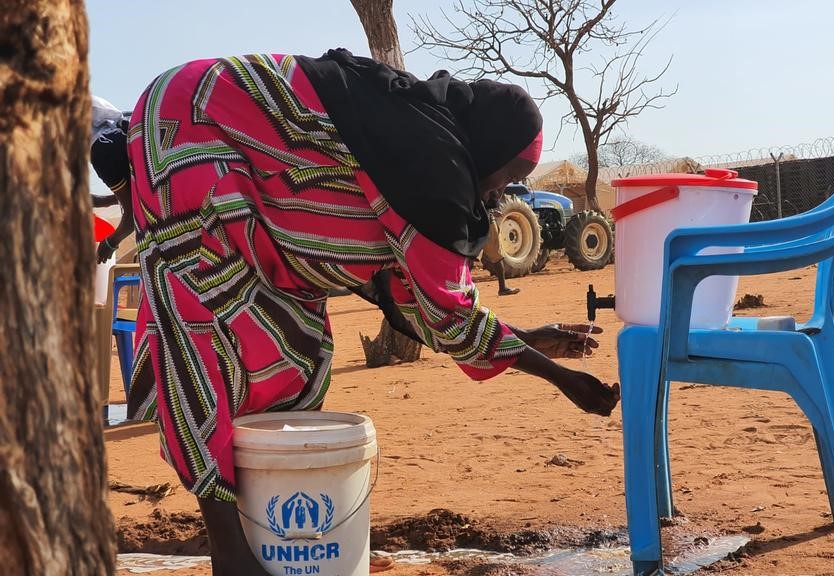Public Health during COVID-19
Coronaviruses are extremely contagious. COVID-19 is the disease caused by the novel coronavirus. UNHCR is working on behalf of refugees and the forcibly displaced to help slow and stop the spread of the virus.
Most of the world’s 25.9 million refugees live in overcrowded or densely populated urban shelters, settlements, or camps. Space, soap, and water, the prescribed measures to protect oneself and others from the virus, are not easily accessible for many of them. This makes refugees extremely vulnerable to the coronavirus’s potentially catastrophic impact on health and well-being.
Many refugees also live in low-income countries that are already impacted by humanitarian crises and have weak health systems. UNHCR’s public health approach to the COVID-19 addresses the specific barriers refugees face during the pandemic.
UNHCR’s public health approach to the COVID-19 pandemic aims to ensure that refugees have access to lifesaving health services, including early diagnoses, and essential medicines and medical equipment for case management and promotes essential prevention measures, such as handwashing with soap and respiratory hygiene, to allow refugees to better protect themselves.
Working with host governments
UNHCR is advocating with and supporting governments for the inclusion of refugees in national COVID-19 preparedness and response plans. In line with the 2019 Novel Coronavirus Strategic Preparedness and Response Plan, UNHCR advocates for the inclusion of refugees in estimations and planning for staff capacity, services, medications, personal protective equipment, and other medical supplies needed in preparation for and during a novel coronavirus outbreak.
Distributing essential medicines and supplies
UNHCR is distributing personal protective equipment (PPE) for health staff (surgical masks, N95 masks, goggles, gowns, gloves), disinfectants, supplies to manage medical waste, laboratory supplies, medicines and medical equipment for case management.
Increasing access to water, sanitation and hygiene (WASH)
To foster the safest possible environment for refugees, UNHCR is increasing the number of handwashing stations at collective shelters, reception and transit centers and other gathering points and has improved medical waste management capacity in health-care facilities. UNHCR is also constructing or renovating isolation and quarantine facilities including through the use of refugee housing units, repurposed tents, hospital tents and semi-permanent structures.
Strengthening capacity of health workers
In these unprecedented times, UNHCR is training and supporting health workers in health facilities as well as community health workers on novel coronavirus preparedness and response. Health care workers in refugee sites are being equipped with knowledge and tools in surveillance for COVID-19, case management, contact tracing, and infection prevention and control. Community health workers in camps are learning about key coronavirus messages on how the virus spreads, how people can protect themselves, and how to identify symptoms. Community health workers then share the messages with refugees, as appropriate, including via face-to-face interaction, WhatsApp messages, or social media.
Providing mental health and psychosocial support
UNHCR is helping refugees cope with the psychological stressors caused by the pandemic, related to quarantining and potential loss of livelihoods. Psychologists and community psychosocial volunteers are providing refugees with mental health support, including teletherapy.
Communicating with communities
Two-way dialogue is at the core of UNHCR’s COVID-19 approach when communicating with refugee communities. UNHCR has shared with refugee communities culturally and linguistically appropriate messages on handwashing and physical distancing, self-isolation, and where to access health-care services. Refugees can access information and ask questions through hotlines, community outreach workers, and web-based platforms.
Maintaining a minimum continuity of services
To reduce or avoid illness, injury and death not related to the pandemic, UNHCR has disseminated guidance to operations and partners promoting continuity of essential health and nutrition services. UNHCR put particular focus on continued access to primary health, immunization, sexual and reproductive health, HIV, tuberculosis, mental health, and acute malnutrition and infant and young child feeding services.
Mental health and psychosocial support
Storybook for children: My hero is you (English - French - Spanish - Arabic)
IASC Basic Psychosocial Skills – A Guide for COVID-19 Responders (external link)
IASC Operational considerations for multisectoral mental health and psychosocial support programmes during the COVID-19 pandemic (29 May 2020) (external link)
Nutrition
IASC Interim Guidance on COVID-19 Outbreak Readiness and Response - Food Distribution - March 2020
Management of Child Wasting in the Context of COVID-19 - 27 March 2020
Infant & Young Child Feeding in the Context of COVID-19 Version 1 - 30 March 2020
GTAM Guidance for Nutrition COVID-19 Version 1 - 13 March 2020
Sexual and reproductive health
Inter-Agency Working Group on Reproductive Health in crises:
- Programmatic guidance for sexual and reproductive health in humanitarian and fragile settings during the COVID-19 pandemic (external link)
- Extra programmatic guidance

